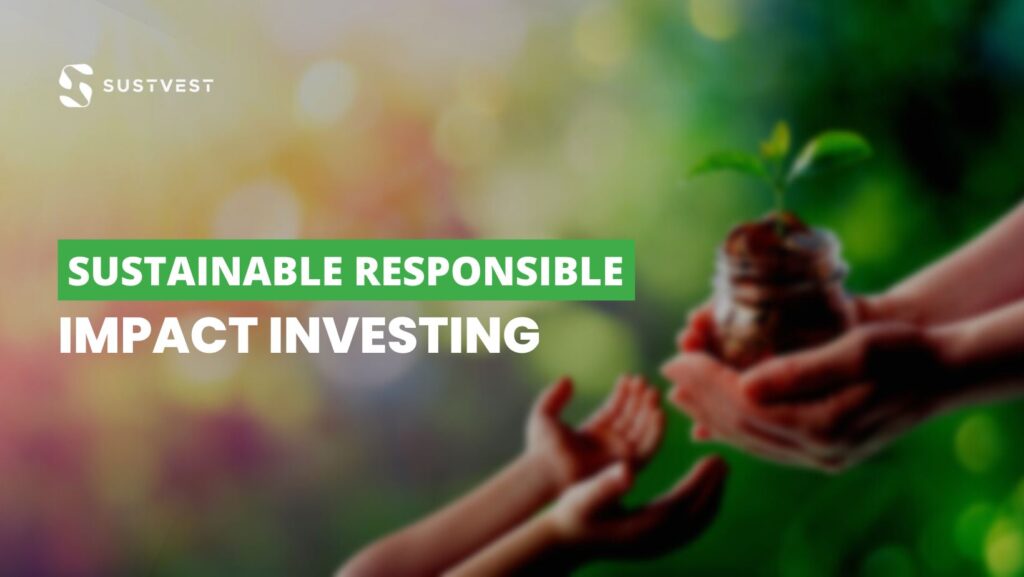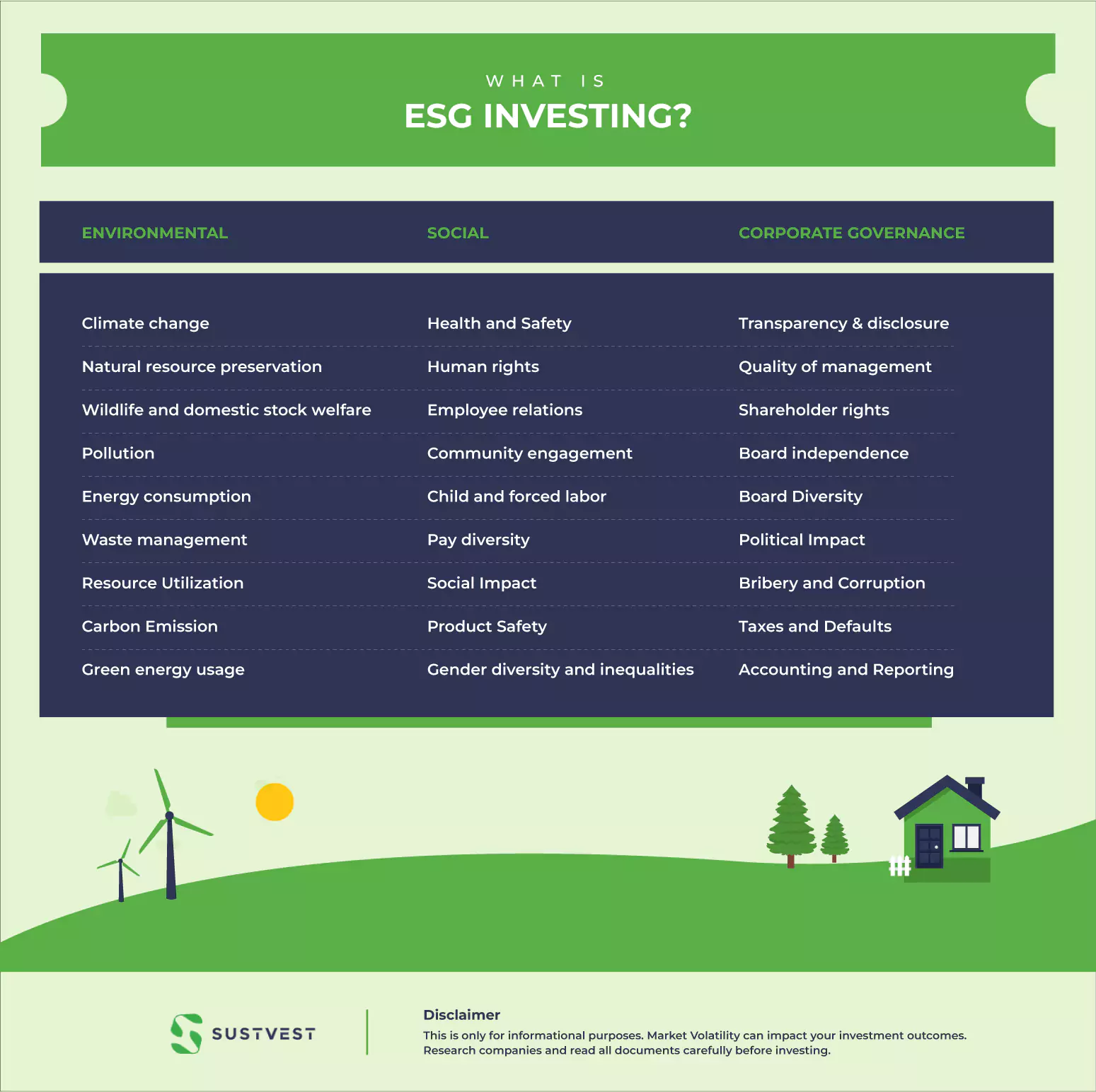“In every deliberation, one must consider the impact on the 7th generation” – a timeless quote from The Great Law of Peace by the Iroquois Nation that should resonate with us more than ever in today’s world.
The effects of our actions will weigh heavily on generations to come. Climate change, in particular, is one such effect that poses an existential threat to us and our descendants.
The fight against climate change has brought nations together as they collaborate to create regulations that demand businesses to take deliberate actions that benefit the environment, society and the law. We are witnessing an exciting development, as companies are now being held accountable for their impact on the planet and people. It’s time for businesses to step up and contribute to a better future for all!
“What is Sustainable, Responsible, Impact Investing?” is the central question we aim to answer in this article, covering both positive and negative impact investing and emphasizing the significance of Why Is It Important To Invest In SRI? and What Is ESG Investing? funds and companies.
Before diving deeper into the subject, let’s begin by understanding what is Sustainable Responsible Impact Investing (SRI) means.

What Is Sustainable, Responsible, And Impact Investing?
Sustainable, Responsible and Impact Investing, or SRI, is a financial approach that empowers companies and investors to make more ethical and eco-friendly financial decisions.
Whether it is combating environmental changes or gender inequalities at work or advocating for more fair governance practices, people want to align themselves with those who prioritize the well-being of their world’s three key pillars: people, environment, and economy.
Fortunately, SRI has outlined some guidelines to create a balance between all three, which means you can invest in a sustainable company that doesn’t harm the environment and still gives you better returns. But how would you determine which companies are sincere about being committed to sustainability?
Using ESG factors, we can sift through the companies for SRI. Let’s give them a closer look:
What Is ESG Investing?
ESG, or Environment, Social, and Governance criteria, are a set of standards designed to assess a company’s potential for investment returns and their positive corporate and environmental outcomes.
These criteria help assign ratings to companies based on their adherence to ESG guidelines. ESG ratings are a valuable tool for investors to determine a company’s sustainability level. By leveraging this information, investors can identify the most promising investment opportunities in the market that align with their financial goals and moral ethics.
Here are the aspects covered by the three factors – Environmental, Social, and Governance:
| ESG Factors to Analyze Before Investing in a Company for SRI | ||
| ENVIRONMENTAL | SOCIAL | CORPORATE GOVERNANCE |
| Climate change | Health and Safety | Transparency & disclosure |
| Natural resource preservation | Human rights | Quality of management |
| Wildlife and domestic stock welfare | Employee relations | Shareholder rights |
| Pollution | Community engagement | Board independence |
| Energy consumption | Child and forced labor | Board Diversity |
| Waste management | Pay diversity | Political Impact |
| Resource Utilization | Social Impact | Bribery and Corruption |
| Carbon Emission | Product Safety | Taxes and Defaults |
| Green energy usage | Gender diversity and inequalities | Accounting and Reporting |
In India, investors can take advantage of various tools and guidelines to identify companies that prioritize ESG principles. One such resource is the S&P ESG India Index, which provides an investable index of companies that adhere to ESG criteria. SEBI has also published the Green Bond Guidelines to promote environmentally responsible investments. And the Bombay Stock Exchange has released a Guidance Document on ESG Disclosures giving a comprehensive overview of ESG reporting requirements for listed companies.
But why should you care about ESG investing? For one, it is growing exponentially among financial institutions, investors, and philanthropists alike. By leveraging its wealth of data and other tools, these players are making wiser, more ethical investment decisions.
Take the tobacco and liquor industries, for example. These sectors have seen a decrease in financial support worldwide as investors following ESG and SRI strategies steer clear of them, despite their significant contributions to GDP.
Recent high-profile scandals, like the Vijay Mallya case and the Videocon bank fraud involving former ICICI CEO Chanda Kochhar, negatively impacted investor sentiment. The fallout from these scandals caused ICICI’s shares to plummet, discouraging investors from further involvement.
Even Byju’s, known for its innovative educational technology, faced backlash over its work culture, with employees likening it to slavery. The negative attention dealt a severe blow to Byju’s reputation – one the company is still working hard to recover from.
Companies with otherwise strong reputations can fall out of favor quickly if they fail to uphold ESG principles. So, given these trends, we must understand the six main types of SRI investing strategies: Negative Screening, ESG Investing, Positive Investing, Shareholder Advocacy, Impact Investing, and Religious Theme Investing. In this article, we will focus on Negative and Positive Investing.

What Is Ethical Or Negative Exclusion?
Ethical or negative exclusion is an SRI strategy for making investment decisions based on ethics and morals. What is right for you may not be the same for someone else. There’s a degree of compromise involved in deciding how much ESG guidelines mean to you.
For some investors, this SRI strategy means avoiding companies associated with weapons, firearms, or controversial products like liquor, tobacco, cigarettes, processed foods, and plastic items. On the other hand, others may prioritize human rights, work culture, or resource utilization when evaluating potential investments.
Ethical or negative exclusion refers to making investment choices based on personal values and beliefs.
What is Positive Inclusionary/ Impact Investing?
Have you ever felt guilty about investing in companies that harm the environment or exploit resources? If you care deeply about sustainability, you probably have. That’s where Positive Inclusionary/Impact Investing comes in.
This approach to investing is all about putting your money into companies dedicated to contributing to society and the environment. If you are someone who gets fired up about things like fossil fuel exploitation or other environmentally harmful practices, you probably wouldn’t want to invest in the Oil and Gas sector, right? Instead, you would be more interested in companies working in the renewable energy sector – like solar or hydropower – or ones that focus on recycling and repurposing waste.
Also Read : Learn 6 Renewable Energy Myths and Facts (2023 Edition)
In Positive Inclusionary/Impact Investing, the focus is on a company’s outcome on social, economic, and environmental factors. It’s a way to align your investment choices with your values and make a difference in the world through your financial decisions.
Why Is It Important To Invest In SRI?
Let’s face it. We all want to make money. Wouldn’t it be cool if you could do that and contribute to the world in a positive way? That’s where Sustainable Responsible Investing (SRI) comes in. Here are some key reasons why SRI is so important:
- SRI is driving the market shift from non-renewable to renewable energy assets – a crucial step in creating a more sustainable future.
- Climate change affects every nation, and SRI and ESG are essential resources to counter its impact. Adhering to its guidelines is the only way to go forward.
- As an investor, you must ensure companies comply with SRI and ESG standards. Your investment decisions can help drive change and encourage companies to do the right thing.
- Your investment will help sustainable companies grow and surpass traditional companies.
- Supporting the sustainable sector can also lead to competitive returns on your investment – a win-win solution for you and the planet.
- By choosing to invest in SRI, you’re standing up for something more than just monetary gains. It’s an opportunity to make a real difference and be a catalyst for change.
Conclusion
Investing in SRI is not just about making sound financial decisions. It is about aligning your investments with your values. We hope you are well-equipped to answer any questions about sustainable, responsible, and impact investing that come your way.
Ready to venture into the future of investing? Look no further than SustVest. Contact us today to take the first step toward sustainable investment. Let’s build a better world together!

Founder of Sustvest
Hardik completed his B.Tech from BITS Pilani. Keeping the current global scenario, the growth of renewable energy in mind, and people looking for investment opportunities in mind he founded SustVest ( formerly, Solar Grid X ) in 2018. This venture led him to achieve the ‘Emerging Fintech Talent of the Year in MENA region ‘ in October 2019.




